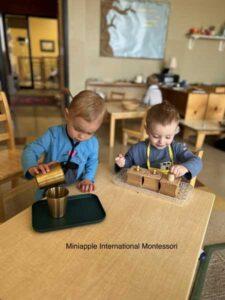
As a parent, it’s natural that you want your child to grow up to be confident and independent, ready to take on the challenges of the world with a positive attitude. You want them to feel empowered to pursue their passions and cultivate a sense of self-discovery.
To this end, the Montessori approach is rooted in encouraging children to be independent thinkers, with a focus on fostering a can-do attitude towards learning and life. So how exactly does Montessori education cultivate this mindset in young minds? Read on to learn more.
Focus on Process Over Product
The Montessori approach emphasizes the ‘process over product’, which fundamentally shifts the focus from the end result to the learning journey. This perspective encourages children to value their own efforts and progress rather than solely striving for a perfect end product.
For instance, if your child is working on a puzzle, the goal isn’t just to complete it – each piece is an opportunity to learn about patterns, spatial relationships, and problem-solving. This mindset helps children develop a growth mindset, where they focus on effort and progress rather than being fixated on getting everything perfect.
An emphasis on the final grade or the finished project can lead to a fear of making mistakes and a reluctance to take on challenging tasks. In contrast, the Montessori method cultivates an environment where mistakes are viewed as learning opportunities, fostering resilience and a growth mindset.
Children are encouraged to explore, experiment, and engage deeply with their work, learning to appreciate the satisfaction that comes with effort and improvement. This focus on the learning process nurtures a can-do attitude, empowering them to embrace challenges with enthusiasm and confidence.
Giving Children Autonomy
The Montessori approach fosters autonomy through choice and self-direction, allowing children to learn at their own pace and follow their own interests. This can be as simple as letting a child choose which activity they want to engage in during free play or allowing older students to manage their own time and decide which tasks to prioritize.
The freedom to make choices and direct their own learning helps children develop a sense of responsibility and self-discipline. They realize that they have the power to influence their learning and progress. This not only nurtures a sense of self-confidence but also a proactive, can-do attitude. The child learns to associate effort with success and becomes motivated to take on new challenges and tasks.
When children are passive recipients of knowledge, being told what to learn and when to learn it, it can stifle their natural curiosity and love for learning. In contrast, the autonomy in a Montessori environment empowers children to become active participants in their education, fostering an intrinsic motivation to learn and achieve.
Self-Correcting and Extended Materials
The learning materials in the Montessori classroom have a built-in control of error, meaning children can see when they need to try a different way to complete the work without relying on the teacher to guide them through the process.
The educational materials in the Montessori classroom also offer study extensions which allow children to expand on their knowledge base for endless learning.
Inclusion of Multi-Age Classrooms
The Montessori approach often includes multi-age classrooms, where children of different ages work together in the same environment. This creates a unique social dynamic where older students can act as mentors and role models for younger ones.
Being part of a community that values collaboration and supports individual growth helps children develop empathy and strong interpersonal skills. They learn to appreciate and respect the differences among their peers, leading to a well-rounded, inclusive attitude. This can-do attitude is reflected in their willingness to collaborate and work with others towards common goals.
The multi-age classroom also offers opportunities for children to take on leadership roles and develop confidence in guiding others. This not only contributes to their personal growth but also cultivates a sense of responsibility and self-assurance in their abilities.
At Miniapple International Montessori School, we strive to create an environment that encourages children to be curious, independent, and persistent in their pursuits. Our goal is to empower young minds to develop a can-do attitude towards learning and life, helping them become confident, empathetic, and self-motivated individuals.
Join us in our mission to cultivate empowered young minds and start your child’s journey toward a bright future today!

